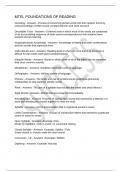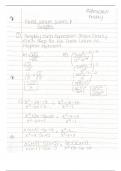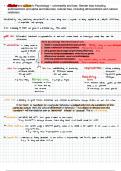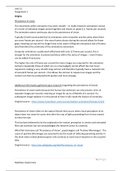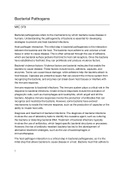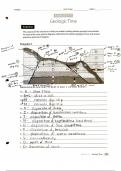ICC 312 - NOTES
3rd year semester 1
,Discourse analysis & ICC
Discourses = ways of being
The understanding how identities and meanings are constituted in & through the interaction itself.
Culture = not the only thing that dictates what you see as acceptable
If we take cultural differences and intercultural negotiations to include any and all interactions between
members of these discourse systems THEN intercultural com is applicable in almost every interaction
you have
Relevance of studying intercultural com
Always think twice before you say something because it might be seen as offensive to the person you
are speaking to. Consider what you say from the perspective of others.
6 reasons:
1. The self-awareness imperative – ICC raises awareness of our own identity + background
(consider what your constructed identity is, and wat stereotypes are that u can be associated
with)
Ethnocentrism: evaluation of other cultures according to preconceptions originating in the
standards and customs of one’s own culture
2. The demographic imperative – pre- vs post-apartheid era, south Africa is a diverse nation, we
need to be sensitive to religious, political, social, racial, gender, age and sexual diversity – can’t
just learn a language and think you are competent to operate in the country, you need to
consider the culture too.
3. The economic imperative – refers to globalization, need to understand how businesses in other
countries go about to bee able to trade on a global level without showing disrespect in any way
– “read the air” (Erin Meyer)
4. The technological imperative – level of accessibility changes between groups, some people find
digital text more important than others, more access to more people through technology can
cause people to be caught in bubbles where they create their own view of what the world is.
5. The peace imperative – consider different age groups, ethnicity, religions etc. need to
understand their background and the historical background (ICC gives insight into how and why
conflicts can happen) don’t study people within a vacuum, can’t watch one TikTok video and
think that all people of that area or race are the same.
6. The ethical imperative – what is good/bad, general moral principles that arise from
communities’ consensus of what is good/accepted. Ethical principles are often culture bound.
Ethics: moral principles that govern a person’s behavior or the conducting of an activity
,Existentialist view of culture is tied to being undetachable and the essence of a group of people
Problem with essential-ism: confuses culture with nature + it places clusters of cultural traits at the level
of groups
It is recommended to view culture in terms of community and change
Identity = interactively created over and over, an individual can have different identities in different
situations
Culture
who makes culture relevant to whom, in which context and for which purpose?
Defining culture has underlying assumptions:
1. Culture as a national asset:
We are looking at culture from the perspective as we often see in the tourism industry
- High culture: aspects within the country such as its history, arts and theatre
- Popular culture: music, folklore, cuisine
- Country facts: aspects of the country that might pop up when you start to research it like the
languages, the currency.
Considering culture as a national asset, what we are referring to are the aspects of a culture that
might be popping up most frequently on a website eg etiquette + norms
2. Cultural difference as a challenge
We often consider the less surface lever, more practical aspects of day to day living and the norms and
business hours as well as information about interpersonal relationships (honorifics when it comes to
language / nonverbal communication) dress code, physical proximity + personal boundaries, gift giving
and even grooming.
3. Culture in relation to citizenship
This is presented as consisting as any aspects of culture that are seen to represent a particular identity.
Eg in south Africa -> now-now and just-now
There is a danger to using certain cultural practices as an identifier, that being able to identify a certain
culture by specific markable aspects often links certain practices to discrimination.
The inclusionary & exclusionary nature of ‘culture’
Inclusionary aspect: banding together and inside joke of now-now and just-now of South Africans,
others can share in it when they come to south Africa, because everyone uses it as common language
, The underlying assumptions related to what culture is, include some people and exclude others
Exclusionary aspect:
- High Culture: these experiences: theatre, exposure to the arts, a rich understanding of their
cultural history are often experiences only available to people who can afford them + a higher
level of education, so there is this socio-economic distinction drawn between members of the
same nationality who now have different aspects of their culture, so just because of someone’s
lower social status and ability to afford a teaching on their culture, they have less culture than
those who can afford to be exposed to these aspects of higher culture
- Culture as a form of citizenship: lumping everyone forming a part of a certain citizenship
category can downplay experiences of some people within the country, not all South Africans
have the same norms and values, everyone is very diverse
- Cultural difference as a challenge
The exclusion is problematic, because individuals are being excluded from the culture
The presupposition of culture
Culture is an entity, this is a presupposition, it exists
Culture as a noun: (Russian culture, Indian culture), we immediately trigger a presupposition of
existence, it creates the idea that there is this one thing that can be encapsulated in a neatly packaged
noun-phrase
Culture as a verb: this change from a noun to a verb changes it from an entity to an action or a process,
the entity(noun) understanding of culture is essentialist (it is a part of us) and the process(verb) view is
constructionist (people do or perform a culture, it is created through their actions)
The meaning of CONSTRUCTIONIST is one who construes a legal document (such as the U.S.
Constitution) in a specific way.
Essentialism: the idea that things have basic characteristics that make them what they are, which it is
the task of science and philosophy to discover and describe
“Culture is not a real thing, but an abstract and purely analytical notion.”
When we look at things like holidays and anthems and flags, we often think they reflect and represent
culture, when in actuality they construct and can reconstruct culture. – this becomes apparent when a
nation reinvents itself
Our country = example of a nation that reconstructed itself (got a new flag and national anthem as a
ripple effect of mindset and action for the country)
The theory of cultural essentialism is strongly connected to the metaphor of “cultural roots”, culture in
the context of essentialism is seen as undetachable and deep-seated, and also as the essence of a group
of people.
Problems with essentialism:
3rd year semester 1
,Discourse analysis & ICC
Discourses = ways of being
The understanding how identities and meanings are constituted in & through the interaction itself.
Culture = not the only thing that dictates what you see as acceptable
If we take cultural differences and intercultural negotiations to include any and all interactions between
members of these discourse systems THEN intercultural com is applicable in almost every interaction
you have
Relevance of studying intercultural com
Always think twice before you say something because it might be seen as offensive to the person you
are speaking to. Consider what you say from the perspective of others.
6 reasons:
1. The self-awareness imperative – ICC raises awareness of our own identity + background
(consider what your constructed identity is, and wat stereotypes are that u can be associated
with)
Ethnocentrism: evaluation of other cultures according to preconceptions originating in the
standards and customs of one’s own culture
2. The demographic imperative – pre- vs post-apartheid era, south Africa is a diverse nation, we
need to be sensitive to religious, political, social, racial, gender, age and sexual diversity – can’t
just learn a language and think you are competent to operate in the country, you need to
consider the culture too.
3. The economic imperative – refers to globalization, need to understand how businesses in other
countries go about to bee able to trade on a global level without showing disrespect in any way
– “read the air” (Erin Meyer)
4. The technological imperative – level of accessibility changes between groups, some people find
digital text more important than others, more access to more people through technology can
cause people to be caught in bubbles where they create their own view of what the world is.
5. The peace imperative – consider different age groups, ethnicity, religions etc. need to
understand their background and the historical background (ICC gives insight into how and why
conflicts can happen) don’t study people within a vacuum, can’t watch one TikTok video and
think that all people of that area or race are the same.
6. The ethical imperative – what is good/bad, general moral principles that arise from
communities’ consensus of what is good/accepted. Ethical principles are often culture bound.
Ethics: moral principles that govern a person’s behavior or the conducting of an activity
,Existentialist view of culture is tied to being undetachable and the essence of a group of people
Problem with essential-ism: confuses culture with nature + it places clusters of cultural traits at the level
of groups
It is recommended to view culture in terms of community and change
Identity = interactively created over and over, an individual can have different identities in different
situations
Culture
who makes culture relevant to whom, in which context and for which purpose?
Defining culture has underlying assumptions:
1. Culture as a national asset:
We are looking at culture from the perspective as we often see in the tourism industry
- High culture: aspects within the country such as its history, arts and theatre
- Popular culture: music, folklore, cuisine
- Country facts: aspects of the country that might pop up when you start to research it like the
languages, the currency.
Considering culture as a national asset, what we are referring to are the aspects of a culture that
might be popping up most frequently on a website eg etiquette + norms
2. Cultural difference as a challenge
We often consider the less surface lever, more practical aspects of day to day living and the norms and
business hours as well as information about interpersonal relationships (honorifics when it comes to
language / nonverbal communication) dress code, physical proximity + personal boundaries, gift giving
and even grooming.
3. Culture in relation to citizenship
This is presented as consisting as any aspects of culture that are seen to represent a particular identity.
Eg in south Africa -> now-now and just-now
There is a danger to using certain cultural practices as an identifier, that being able to identify a certain
culture by specific markable aspects often links certain practices to discrimination.
The inclusionary & exclusionary nature of ‘culture’
Inclusionary aspect: banding together and inside joke of now-now and just-now of South Africans,
others can share in it when they come to south Africa, because everyone uses it as common language
, The underlying assumptions related to what culture is, include some people and exclude others
Exclusionary aspect:
- High Culture: these experiences: theatre, exposure to the arts, a rich understanding of their
cultural history are often experiences only available to people who can afford them + a higher
level of education, so there is this socio-economic distinction drawn between members of the
same nationality who now have different aspects of their culture, so just because of someone’s
lower social status and ability to afford a teaching on their culture, they have less culture than
those who can afford to be exposed to these aspects of higher culture
- Culture as a form of citizenship: lumping everyone forming a part of a certain citizenship
category can downplay experiences of some people within the country, not all South Africans
have the same norms and values, everyone is very diverse
- Cultural difference as a challenge
The exclusion is problematic, because individuals are being excluded from the culture
The presupposition of culture
Culture is an entity, this is a presupposition, it exists
Culture as a noun: (Russian culture, Indian culture), we immediately trigger a presupposition of
existence, it creates the idea that there is this one thing that can be encapsulated in a neatly packaged
noun-phrase
Culture as a verb: this change from a noun to a verb changes it from an entity to an action or a process,
the entity(noun) understanding of culture is essentialist (it is a part of us) and the process(verb) view is
constructionist (people do or perform a culture, it is created through their actions)
The meaning of CONSTRUCTIONIST is one who construes a legal document (such as the U.S.
Constitution) in a specific way.
Essentialism: the idea that things have basic characteristics that make them what they are, which it is
the task of science and philosophy to discover and describe
“Culture is not a real thing, but an abstract and purely analytical notion.”
When we look at things like holidays and anthems and flags, we often think they reflect and represent
culture, when in actuality they construct and can reconstruct culture. – this becomes apparent when a
nation reinvents itself
Our country = example of a nation that reconstructed itself (got a new flag and national anthem as a
ripple effect of mindset and action for the country)
The theory of cultural essentialism is strongly connected to the metaphor of “cultural roots”, culture in
the context of essentialism is seen as undetachable and deep-seated, and also as the essence of a group
of people.
Problems with essentialism:



